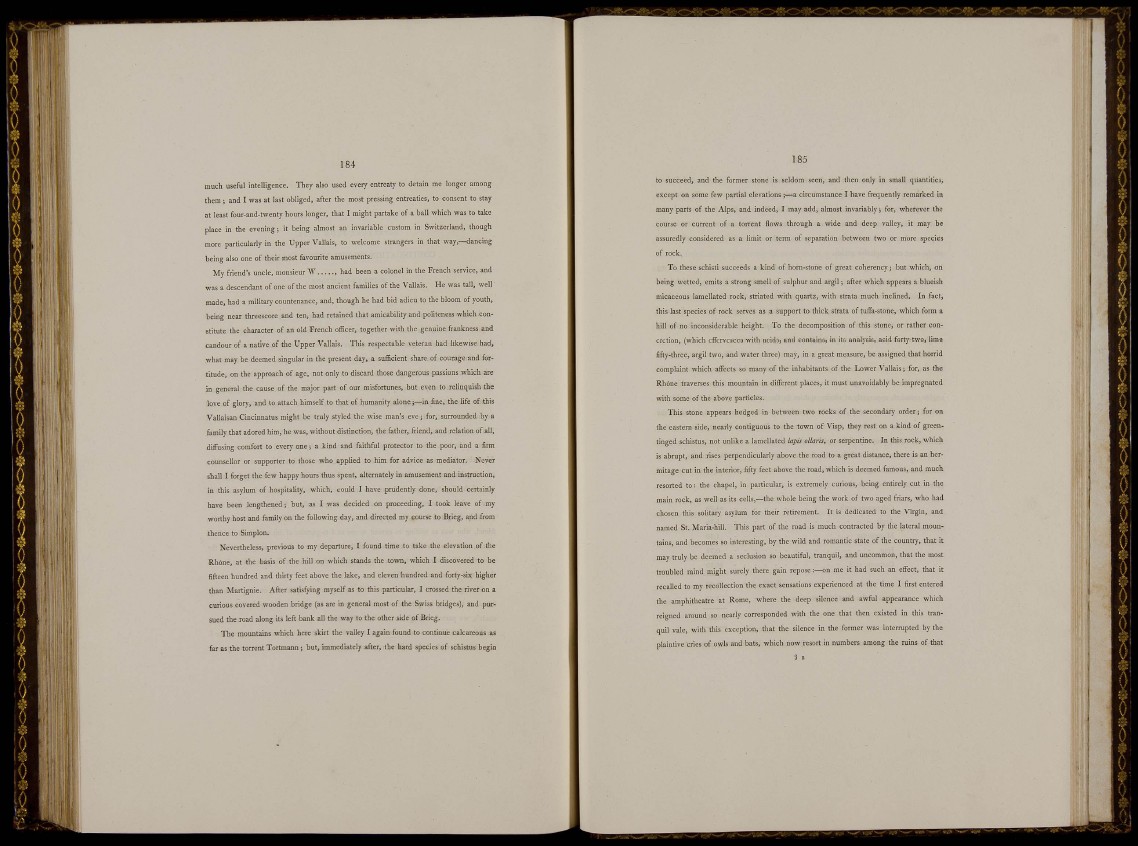
much useful intelligence. They also used every entreaty to detain me longer among
them } and I was at last obliged, after the most pressing entreaties, to consent to stay
at least four-and-twenty hours longer, that I might partake of a ball which was to take
place in the evening 5 it being almost an invariable custom in Switzerland, though
more particularly in the Upper Valíais, to welcome strangers in that way,—dancing
being also one of their most favourite amusements.
My friend's uncle, monsieur W had been a colonel in the French service, and
was a descendant of one of the most ancient families of the Valíais. He was tall, well
made, had a military countenance, and, though he had bid adieu to the bloom of youth,
being near threescore and ten, had retained that amicability and politeness which constitute
the character of an old French officer, together with the genuine frankness and
candour of a native of the Upper Valíais. This respectable veteran had likewise had,
what may be deemed singular in the present day, a sufficient share of courage and fortitude,
on the approach of age, not only to discard those dangerous passions which are
in general the cause of the major part of our misfortunes, but even to relinquish tlie
love of glory, and to attach himself to that of humanity alone ;—in fine, the life of this
Vallaisan Cincinnatus might be truly styled the wise man's eve ; for, surrounded by a
family that adored him, he was, without distinction, the father, friend, and relation of all,
diffusing comfort to every one ; a kind and faithful protector to the poor, and a firm
counsellor or supporter to those who applied to him for advice as mediator. Never
shall I forget the few happy hours thus spent, alternately in amusement and instruction,
in this asylum of hospitality, which, could I have prudently done, should certainly
have been lengthened; but, as I was decided on proceeding, I took leave of my
worthy host and family on the following day, and directed my course to Brieg, and from
thence to Simplón.
Nevertheless, previous to my departure, I found time to take the elevation of the
Rhone, at the basis of the hill on which stands the town, which I discovered to be
fifteen hundred and thirty feet above the lake, and eleven hundred and forty-six higher
than Martignie. After satisfying myself as to this particular, I crossed the river on a
curious covered wooden bridge (as are in general most of the Swiss bridges), and pursued
the road along its left bank all the way to the other side of Brieg.
The mountains which here skirt the valley I again found to continue calcareous as
far as the torrent Tortmann ; but, immediately after, the hard specics of schistus begin
1 8 5
to succeed, and the former stone is seldom seen, and then only in small quantities,
except on some few partial elevations ;—a circumstance I have frequently remarked in
many parts of the Alps, and indeed, I may add, almost invariably j for, wherever the
course or current of a torrent flows through a wide and deep valley, it may be
assuredly considered as a limit or term of separation between two or more species
of rock.
T o these schisti succeeds a kind of horn-stone of great coherency ¡ but which, on
being wetted, emits a strong smell of sulphur and argil ; after which appears a blueish
micaceous lamellated rock, striated with quartz, with strata much inclined. In fact,
this last species of rock serves as a support to thick strata of tuffa-stone, which form a
hill of no inconsiderable height. To the decomposition of this stone, or rather concretion,
(which cfFcrvesces with acids, and contains, in its analysis, acid forty-two, lime
fifty-three, argil two, and water three) may, in a great measure, be assigned that horrid
complaint which affects so many of the inhabitants of the Lower Valíais ; for, as the
Rhône traverses this mountain in different places, it must unavoidably be impregnated
with some of the above particles.
This stone appears hedged in between two rocks of the secondary order ; for on
the eastern side, nearly contiguous to the town of Visp, they rest on a kind of greentinged
schistus, not unlike a lamellated ¿apis oUaris, or serpentine. In this rock, which
is abrupt, and rises perpendicularly above the road to a great distance, there is an hermitage
cut in the interior, fifty feet above the road, which is deemed famous, and much
resorted to : the chapel, in particular, is extremely curious, being entirely cut in the
main rock, as well as its cells,—the whole being the work of two aged friars, who had
chosen this solitary asylum for (heir retirement. It is dedicated to the Virgin, and
named St. Maria-hill. This part of the road is much contracted by the lateral mountains,
and becomes so interesting, by the wild and romantic state of the country, that it
may truly be deemed a seclusion so beautiful, tranquil, and uncommon, that the most
troubled mind might surely there gain repose :—on me it had such an effect, that it
recalled to my recollection the exact sensations experienced at the time I first entered
the amphitheatre at Rome, where the deep silence and awful appearance which
reigned around so nearly corresponded with the one that then existed in this tranquil
vale, with tliis exception, that the silence in the former was interrupted by the
plaintive cries of owls and bats, which now resort in numbers among the ruins of that
iii M i'